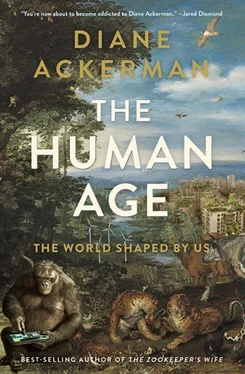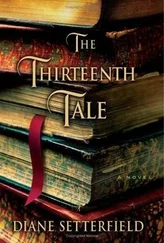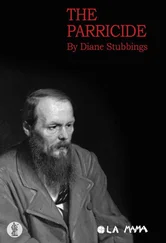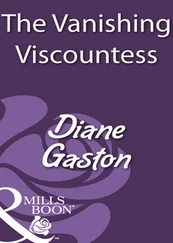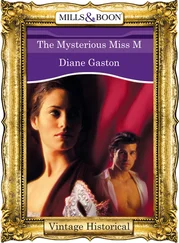Parents today worry about the toll of screen time on their children’s brains; the American Medical Association recommends none at all before the age of two. Yet a tech-enthused parent can even buy a child’s “iPotty for iPad,” a potty-training seat with built-in iPad holder, and find potty-training apps and interactive books at the iPad app store. Matt isn’t concerned about Budi’s iPad play, because unlike his own boys, Budi is a casual iPad user, and no one has studied the effect of screen time on the brains of orangutans. Would it make their senses and our own more alike? Anyway, because Budi is growing up surrounded by zoo life, human technology and culture will influence his brain in myriad ways, just as it does the brains of children. For good or bad, we use our rich imaginations to transfigure the world for ourselves and other creatures, banishing some critters we regard as “pests,” while inviting others to share the curiosities we’ve invented (medicine, complex tools, food, special lingo, digital toys), urging them to blur the line with us between natural and unnatural .
IMAGINE, IF YOU like, Budi holding an iPad whose apps and games are chapters in this book. By touching the screen, he opens one, then another, merely listening to the story as human voices stream past, or watching colorful faces and vistas intently. In some he even catches a glimpse of himself, iPad in hand, as either an ape kid at play or a vital ambassador for his dwindling species. Both roles are his real-life destiny.
Lifting one hairy orange finger over the screen, Budi hesitates a moment, then touches the first chapter. When he does, a snowstorm opens up, with college students dashing between buildings, books clutched inside their parkas…
Wild Heart, Anthropocene Mind
Knee-deep in the blizzard of 1978, when wind-whipped sails of snow tacked across Lake Cayuga, and the streets looked like a toboggan run, I was a student in upstate New York. Despite the weather, classes met, and scientists with souls luminous as watch dials were talking about nuclear winter, the likely changes in Earth’s climate in the aftermath of a nuclear war: the sun white cotton in a perishable sky, dust clouds thickening over the Earth, plants forgetting how to green, summer beginning at twenty below zero, and then the seasons failing all living things. It seemed a possible scenario, since in Washington and Moscow, politicians were outdaring each other with playground bravado. This was the first time I’d heard my elders suggesting that we were now capable of unraveling the whole atmosphere shrouding Earth, and I was both wonder-struck and worried.
Only moments before, in geological time, we were speechless shadows on the savanna, foragers and hunters of small game. How had we become such a planetary threat? As the lectures and snow squalls ebbed, we students seemed small radiant forms in a vast white madness.
A quarter of a century later, Nobel laureate Paul Crutzen (who discovered the hole in the ozone layer and first introduced the idea of nuclear winter) stepped onto the world stage again, arguing that we’ve become such powerful agents of planetary change that we need to rename the geological age in which we live. Elite scientists from many nations agreed, and a distinguished panel at the Geological Society of London (the official arbiter of the geologic time scale) began weighing the evidence and working to update the name of our epoch from its rocky designation, Holocene (“Recent Whole”), to one that recognizes, for the first time, our unparalleled dominion over the whole planet, Anthropocene—the Human Age. [2] The term “Anthropocene” was coined by the aquatic ecologist Eugene Stoermer (Emeritus, University of Michigan), who used it at a conference, and Paul Crutzen, who currently works at the Department of Atmospheric Chemistry at the Max Planck Institute in Mainz, Germany; the Scripps Institution of Oceanography at the University of California, San Diego; and Seoul National University in South Korea.
By international agreement, geologists divide Earth’s environmental history into phases, based on ruling empires of rock, ocean, and life; it’s similar to how we use “Elizabethan” and other royal dynasties to denote periods of human history. Deep ice cores in the Antarctic tell us of ancient atmospheres, fossil remains reveal ancient oceans and life forms, and more is written in silt and cataloged in stone. Previous periods, like the Jurassic, which we identify with dinosaurs, lasted millions of years, and we sometimes cleave them into smaller units, as changing epochs and eras slide into view. Each one adds a thread, however thin, to the tapestry. How wide a stripe will we leave in the fossil record?
PEOPLE WHO ARE recognizably human have walked the Earth for roughly two hundred thousand years. During those millennia, we survived by continuously adapting to our fickle environment. We braved harsh weathers and punishing landscapes, and feared animals much fiercer than we were, bowing to nature, whose spell overwhelmed us, whose magnificence humbled us, and around which we anxiously rigged our lives. After a passage of time too long to fully imagine, and too many impression-mad lives to tally, we began rebelling against the forces of nature. We grew handy, resourceful, flexible, clever, cooperative. We captured fire, chipped tools, hewed spears and needles, coined language and spent it everywhere we roamed. And then we began multiplying at breathtaking speed.
In the year 1000 BC, the entire world population was just 1 million. By AD 1000 it was 300 million. In 1500, it had grown to 500 million. Since then we’ve started reproducing exponentially. The world population has quadrupled since 1870. According to the BBC News website, when I was born, on October 7, 1948, I became the 2,490,398,416th person alive on Earth and the 75,528,527,432nd person to have lived since history began. [3] http://www.bbc.co.uk/news/world-15391515 .
In the Middle Ages, we were still able to count people in millions. Today there are 7 billion of us. As the biologist E. O. Wilson says, “The pattern of human population growth in the twentieth century was more bacterial than primate.” According to Wilson, the human biomass is now a hundred times greater than that of any other large animal species that has ever existed on Earth. [4] “Nature,” as E. O. Wilson defines it in The Creation (New York: W. W. Norton, 2006), includes “all on planet Earth that has no need of us and can stand alone” (15).
In our cities 3.2 billion people crowd together, and urban planners predict that by the year 2050 nearly two-thirds of the world’s projected 10 billion people will be city-dwellers.
By the end of this decade, the history of planet Earth will be rewritten, textbooks will slip out of date, and teachers will need to unveil a bold, exciting, and possibly disturbing new reality. During our brief sojourn on Earth, thanks to exhilarating technologies, fossil fuel use, agriculture, and ballooning populations, the human race has become the single dominant force of change on the planet. For one species radically to alter the entire natural world is almost unprecedented in all of Earth’s 4.5-billion-year history.
The only other time it happened was billions of years ago, before anything like golden-shouldered parakeets or marine iguanas, when the atmosphere was a poisonous brew and a time-traveling human would have needed to wear a gas mask. Then only spongy colonies of one-celled, blue-green algae blanketed the shallows, dining on water and sunlight, and pumping torrents of oxygen—their version of flatulence—into the atmosphere. Gradually, the air and ocean seethed with oxygen, the sky sweetened, and Earth welcomed creatures with lungs. It’s a humbling thought, but one life form’s excrement is another’s tonic. For nearly five billion years, life ticked and tocked through an immensity of bold experiments, which the algae’s recreation of the planet made possible, including all sorts of leaves and tongues, pedigrees and tribes, from Venus flytraps to humans. Then, improbably for origins so mundane, in roughly the last two or three hundred years, humans have become the second species to dramatically alter the natural world from earth to sky.
Читать дальше
